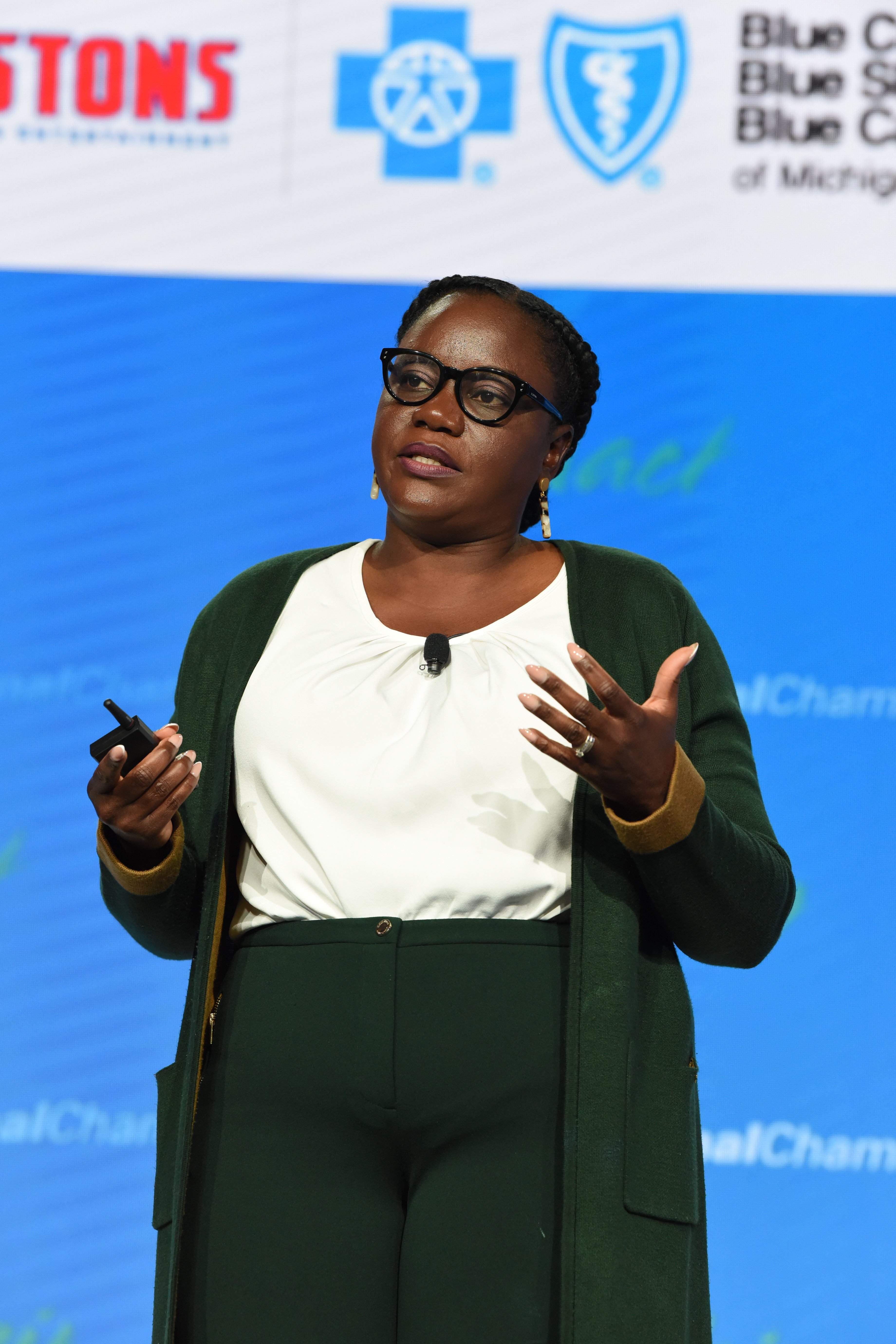Chamber Bringing the Gallup Center on Black Voices to Detroit: Data Driving Equity
June 2, 2022Key Takeaways:
- After two years of collaboration and planning with the Detroit Regional Chamber, the Gallup Center on Black Voices is coming to Detroit to measure the lived experiences Black Detroiters and monitor progress toward racial equity.
- Research needs to be inclusive, so that it’s not research “on” a certain community, but rather, research “with” a community.
- Equity is more than representation and belonging — it’s about shifting power and resources, and determining who is making decisions on behalf of whom.
 Camille Lloyd, executive director of the Gallup Center on Black Voices, kicked off a compelling discussion about the importance of data collection and measurement to inform collective action toward racial and economic equity. Following her keynote address, Detroit Regional Chamber President and Chief Executive Officer Sandy K. Baruah announced that the Center, a flagship initiative devoted to studying and highlighting the experience of the more than 40 million Black Americans, will be coming to Detroit.
Camille Lloyd, executive director of the Gallup Center on Black Voices, kicked off a compelling discussion about the importance of data collection and measurement to inform collective action toward racial and economic equity. Following her keynote address, Detroit Regional Chamber President and Chief Executive Officer Sandy K. Baruah announced that the Center, a flagship initiative devoted to studying and highlighting the experience of the more than 40 million Black Americans, will be coming to Detroit.
“For the last 85 years, how we’ve leveraged our reputation for research rigor and as public trust where we are measuring and monitoring public opinion is this idea that we use this trust and public opinion research to establish new measures that shape global conversations,” said Lloyd.
“We want to know and to understand where are those manifestations of systemic disparities? How do they show up in our lives and the abilities that Black Americans have to lead a life well-lived or to achieve equitable outcomes,” Lloyd said.
The Center aims to provide a “listening machine” that creates research rooted in inclusivity, “so that it’s not research on Black Americans, but research with Black Americans.”
Following her remarks, Lloyd was joined on stage by Chamber President and Chief Executive Officer Sandy K. Baruah, President of Bank of America Michigan Matt Elliott, and President and Chief Executive Officer of The Skillman Foundation Angelique Power.
Power shared background on the creation of the Racial Equity Blueprint Group with The Skillman Foundation and a host of business partners, including the Chamber.
“It’s one thing to set a table and to start a conversation, it’s another thing to have people come back week after week after week,” said Power. “Change moves at the speed of trust, and trust moves at the speed of relationships.”
 This convening of businesses and other organizations interested in making a positive difference toward racial equity, Power noted the conversations moved from grieving and processing to mobilizing. Gallup is an important piece of that mobilization.
This convening of businesses and other organizations interested in making a positive difference toward racial equity, Power noted the conversations moved from grieving and processing to mobilizing. Gallup is an important piece of that mobilization.
“Understanding the goal is to provide a common premise that leads to collective action and having actionable data and you cannot do that without working with organizations and individuals that are on the ground who live in those communities,” said Lloyd.
Elliott and his team at Bank of America have also been closely engaged with this work. This isn’t only a passion of his, but it’s core to his company. Elliott mentioned asking employees if they can bring their whole self to work as a starting point for inclusion.
“This is core to our strategy,” he said. “Companies that have diverse management teams make better decisions – they’re more profitable.”
Power continued the conversation addressing the perception that progress and interest has stalled.
“There’s a misunderstanding of what equity is,” she said. “It really isn’t just about representation – although that’s extremely important. …It’s about shifting power and shifting resources. It’s following the money – where it’s going inside of any institution. It’s accountability where communities hold us accountable. It’s about transparency. It’s recognizing our privilege. …And asking who is making decisions on behalf of whom.”
The work needs to shift now to the day-to-day operationalization of the claims organizations made related to these topics.
Elliott shared how he thinks corporate America is doing in this work and, similarly, acknowledged the gap between expressing commitment and being able to act on it.
In closing, Lloyd shared, “it’s not centering the data because it’s really about centering the change and impacting people’s lives.”
